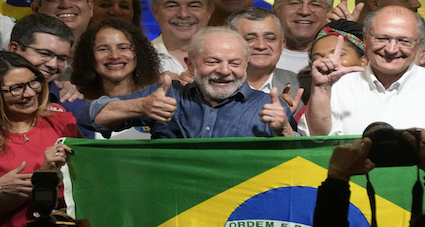Brazil’s former leftist president, Luiz Inácio Lula da Silva, has sealed an astonishing political comeback, beating the far-right incumbent Jair Bolsonaro in one of the most significant and bruising elections in the country’s history.
With 99% of votes counted, Silva, a former factory worker who became Brazil’s first working-class president exactly 20 years ago, had secured 50.8% of the vote. Bolsonaro, a firebrand who was elected in 2018, received 49.1%.
Lula served as Brazil’s president for two terms, from 2003 to 2011.
A few streets away on Paulista Avenue, one of the city’s main arteries, ecstatic Lula supporters gathered to celebrate his victory and the downfall of a radical rightwing president whose presidency produced an environmental tragedy and saw nearly 700,000 Brazilians die of Covid.
This is very bad news for the West and elites of the world, the globalists, as Lula has recently proposed creating a Latin American currency to “free himself from the dollar.”
“We will create a currency in Latin America,” because “we don’t have to depend on dollar,” Lula had said in a speech in a rally on May 2.
He revealed that the currency would be called the South.
Lula explained that Latin American countries could still maintain their sovereign national currency, but could use the South to do bilateral trade with each other, instead of having to exchange for US dollars.
The South could also help reduce inflation in the region, Lula argued.
Lula said the currency’s goal would be to deepen Latin American integration and strengthen the region’s economic sovereignty, weakening its dependence on the United States.
Under Brazil’s current government, headed by far-right leader Jair Bolsonaro, the South American giant has been subservient to Washington, while attacking leftist governments in the region.
Bolsonaro’s Brazil has refused to recognize the legitimacy of the Chavista government in neighboring Venezuela, and has even supported violent cross-border terrorist attacks against it.
Lula also promised to revive the BRICS system, integrating Brazil, Russia, India, China and South Africa into an independent economic architecture to challenge Western financial hegemony
In 2020, Lula published a call “For a multipolar world.” He explained that his goal is “the creation of a multipolar world, free from unilateral hegemony and sterile bipolar confrontation,” which allows for “a true refounding of the multilateral order, based on the principles of true multilateralism, in which international cooperation truly can prosper.”
Lula’s proposal for the South is certainly not the first time progressive politicians in Latin America have attempted to create a common currency. This has long been a dream of leftist leaders in the region.
The former revolutionary president of Venezuela, Hugo Chávez, developed an international currency as part of the Bolivarian Alliance (ALBA), an economic coalition of leftist governments in Latin America and the Caribbean.
This currency was called the Sucre, and was adopted in 2009 by Venezuela, Nicaragua, Cuba, Bolivia, and Ecuador.

Sucre was an acronym for “Regional Compensation Unitary System”, but it was also a reference to Antonio José de Sucre, who helped lead the fight for South American independence against Spanish colonialism, alongside Simón Bolívar.
Ecuador’s government, under leftist President Rafael Correa, who has a Ph.D. in economics, it was the main adopter of the Sucre.
At its peak in 2012, the Sucre was used for more than a billion dollars in annual bilateral trade in the region.
But the currency fell out of use in 2016, following the death of Chavez in 2013, a massive drop in commodity prices in 2014, the imposition of US sanctions on Venezuela in 2015, and violent coup attempts against Chavez’s successor. Chavez, Nicolas Maduro.
Ecuador’s later right-wing president, Lenín Moreno, with US backing, later withdrew his country from ALBA, dealing a severe blow to Sucre and its dreams of regional integration.
Bolsonaro only came to power in the 2018 elections thanks to a soft US-backed coup.
Lula had been significantly ahead in the polls before the 2018 vote, but Brazil’s judicial system jailed him on trumped-up charges and handed Bolsonaro the victory.
The US department of justice supported this dirty campaign that Lula calls the legal war, or lawfare, to prevent him from returning to the presidency.
The US government also backed the 2016 soft coup against Brazil’s elected president, Dilma Rousseff, also a member of Lula’s Workers’ Party.
The UN Human Rights Commission declared this April that Lula’s prosecution was politically motivated and violated his rights”The investigation and prosecution of former President Lula da Silva violated his right to be tried by an impartial tribunal, his right to privacy, and his political rights,” UN legal experts determined.


